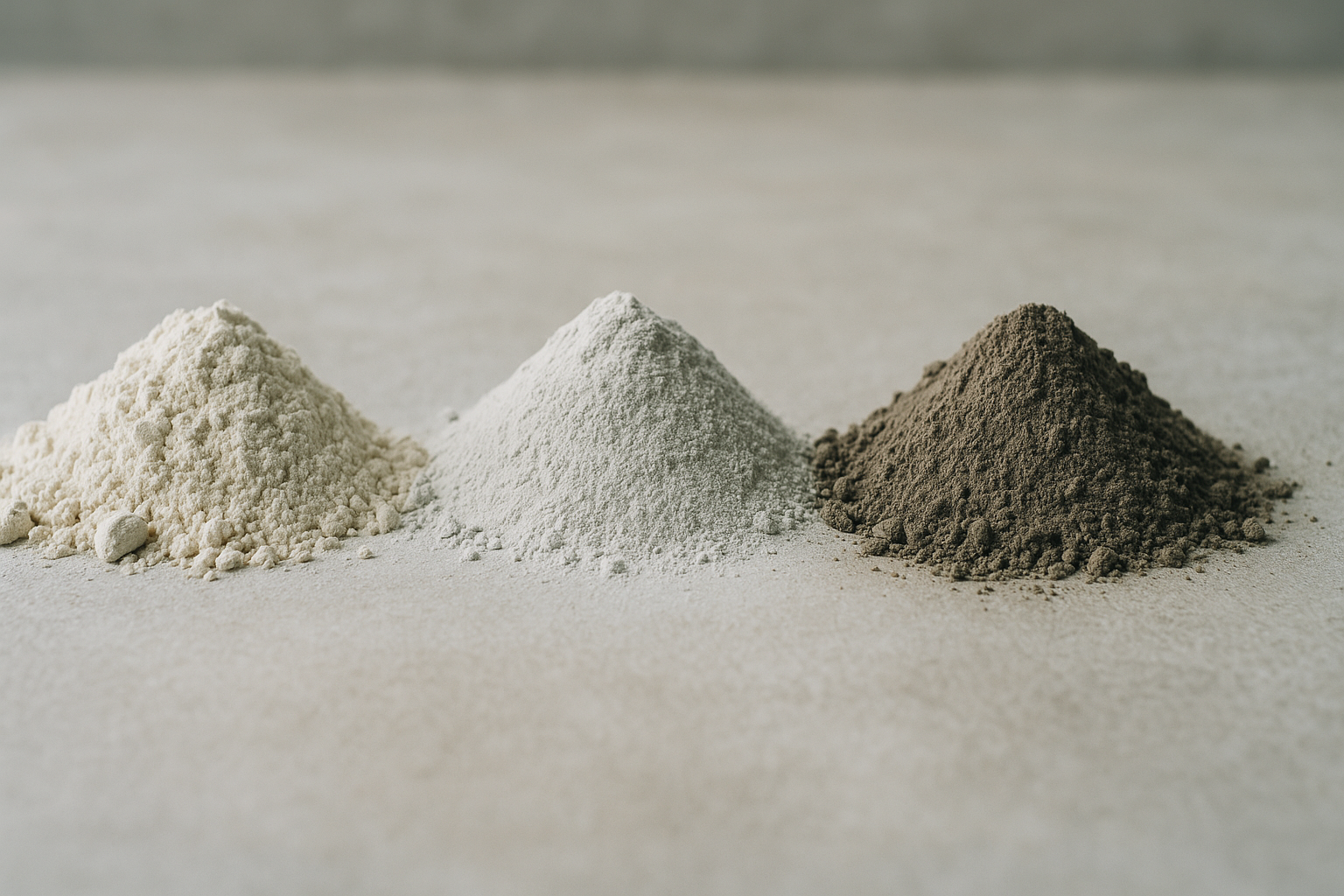Selecting the right bentonite powder for your project can make the difference between success and costly complications. Whether you’re working on construction projects, directional drilling operations, or specialized applications, understanding how to choose between calcium, civil, and HDD bentonite powder will save you time, money, and potential headaches.
Bentonite clay has been used across multiple industries for decades, yet many professionals still struggle with selecting the appropriate type for their specific needs. This comprehensive guide breaks down the key differences, applications, and selection criteria to help you make informed decisions.
Understanding the Fundamentals of Bentonite Types
Before diving into how to choose between calcium, civil, and HDD bentonite powder, let’s establish what sets each type apart.
Calcium bentonite contains calcium ions and has lower swelling potential but exhibits higher green strength compared to sodium-based alternatives. This type performs well in applications requiring controlled expansion and absorption properties.
Sodium bentonite, commonly used in civil applications, offers superior swelling capabilities. It can absorb large amounts of water and expand several times its dry volume, making it perfect for sealing and waterproofing applications.
HDD (Horizontal Directional Drilling) bentonite represents specially formulated drilling fluids designed for trenchless construction projects. These are proprietary blended products using high-quality Wyoming sodium bentonite that develop easy-to-pump slurries with desirable fluid properties for HDD applications.
Key Properties That Drive Selection Decisions
Swelling Characteristics
The swelling behavior of bentonite directly impacts its performance in different applications. Here’s what you need to know:
Calcium Bentonite:
- Limited swelling capacity (3-5 times original volume)
- Controlled expansion properties
- Better dimensional stability
- Higher absorption capacity per unit weight
Civil Grade Sodium Bentonite:
- High swelling potential (10-15 times original volume)
- Excellent sealing properties
- Strong gel formation
- Superior waterproofing capabilities
HDD Bentonite:
- Balanced swelling for borehole stability
- Optimized viscosity development
- Controlled gel strength for cutting transport
- Enhanced filtration control
Chemical Composition Impact
Calcium bentonite contains calcium ions, giving it a distinct set of properties compared to sodium bentonite and generally making it more suitable for absorption applications. The ionic composition affects everything from pH levels to chemical compatibility with other materials.
Sodium bentonite‘s chemical structure creates stronger interlayer bonding, resulting in superior swelling and sealing properties. This makes it the preferred choice for civil engineering applications where water containment is critical.
Application-Specific Selection Guide
When to Choose Calcium Bentonite Powder
Calcium bentonite excels in applications requiring:
Industrial Absorption:
- Oil and grease absorption
- Pet litter manufacturing
- Chemical spill cleanup
- Food processing clarification
Agricultural Applications:
- Soil conditioning
- Fertilizer coating
- Animal feed supplements
- Pond sealing (where controlled swelling is preferred)
Foundry Operations: Calcium bentonite is more commonly used for smaller castings that use “green” or wet molds due to its superior green strength properties.
Civil Grade Bentonite Selection Criteria
Choose civil grade sodium bentonite for:
Waterproofing Projects:
- Basement waterproofing
- Landfill liners
- Pond and reservoir sealing
- Underground structure protection
Construction Applications: Sodium bentonite is extensively used in civil engineering projects for sealing and waterproofing purposes, including pond liners, irrigation systems, and basement waterproofing barriers.
Geotechnical Engineering:
- Slurry wall construction
- Soil stabilization
- Cut-off walls
- Foundation treatment
HDD Bentonite Application Guidelines
Select HDD-specific bentonite when:
Directional Drilling Operations:
- Utility installation projects
- Pipeline construction
- Fiber optic cable installation
- Gas line placement
Drilling Conditions Requiring: Suspension, wellbore stability, filtration control, and reduced torque and drag in complicated soil conditions including clay, sand, and gravel.
Learn the answer to Is Sodium Bentonite Better Than Calcium Bentonite in Construction and see why it ensures stronger sealing and lasting stability.
Technical Performance Comparison
Viscosity and Flow Properties
HDD bentonite formulations prioritize flow characteristics. A primary objective in horizontal directional drilling is to maintain flow, as excessive viscosity can generate undesirable pressures in the borehole when pumping horizontally.
Civil grade bentonite focuses on maximum gel strength for sealing applications, while calcium bentonite maintains moderate viscosity suitable for absorption and filtration uses.
Filtration and Cake Formation
Bentonite helps create higher viscosity downhole, provides gel strength for flushing cuttings, and creates a filter cake to help reduce fluid loss into surrounding formations. This property varies significantly between types:
- HDD Bentonite: Optimized filter cake formation
- Civil Bentonite: Maximum impermeability
- Calcium Bentonite: Controlled filtration for clarification
Environmental and Economic Considerations
Environmental Impact Assessment
Different bentonite types have varying environmental profiles:
Calcium Bentonite:
- Natural absorption properties reduce environmental cleanup costs
- Lower chemical additive requirements
- Biodegradable applications in agriculture
Civil Grade Sodium Bentonite:
- Long-term stability reduces maintenance needs
- Effective barrier properties protect groundwater
- Recyclable in many applications
HDD Bentonite:
- Minimally invasive installation methods
- Reduced surface disruption
- Lower carbon footprint compared to open-cut methods
Cost-Benefit Analysis Framework
When evaluating how to choose between calcium, civil, and HDD bentonite powder, consider:
- Initial Material Costs: HDD bentonite commands premium pricing due to specialized formulation
- Performance Efficiency: Higher-grade materials often reduce total project costs
- Long-term Durability: Civil grade bentonite’s superior sealing reduces maintenance expenses
- Application Volume: Bulk purchasing advantages for large-scale projects
Quality Standards and Specifications
Industry Standards Compliance
Different applications require specific quality certifications:
API Standards: HDD bentonite systems often meet NSF/ANSI Standard 60 certification for potable water applications.
Construction Standards: Civil grade bentonite must meet various ASTM and local building codes for waterproofing applications.
Industrial Grades: Calcium bentonite specifications vary based on end-use requirements in foundries, agriculture, and industrial absorption.
Testing and Verification Protocols
Key testing parameters include:
- Swelling index measurements
- Viscosity development curves
- Filtration loss testing
- Chemical compatibility assessments
- Particle size distribution analysis
How CMS Industries Supports Your Bentonite Selection Process
CMS Industries stands out in the bentonite manufacturing landscape through comprehensive product offerings and technical expertise. As an ISO 9001:2015 certified company, they maintain consistent quality across all bentonite grades while providing the technical support needed for proper material selection.
Their strategic location near world-class ports in Gujarat enables efficient global distribution, while their monthly production capacity exceeding 9,000 metric tons of bentonite powder ensures reliable supply chains. What sets CMS Industries apart is their commitment to understanding specific application requirements and providing tailored solutions rather than one-size-fits-all products.
The company’s extensive mining operations across multiple locations in Kachchh region provide access to diverse bentonite qualities, enabling them to match material properties with specific project requirements. Their technical team works directly with customers to analyze application needs and recommend the optimal bentonite type for each situation.
Best Practices for Implementation
Pre-Selection Testing
Before finalizing your choice between calcium, civil, and HDD bentonite powder:
- Conduct Pilot Testing: Small-scale trials reveal performance characteristics
- Analyze Site Conditions: Soil chemistry, water quality, and environmental factors influence selection
- Evaluate Mixing Requirements: Different types require specific mixing protocols
- Consider Equipment Compatibility: Pumping and handling equipment may favor certain formulations
Storage and Handling Guidelines
Proper storage protects bentonite performance:
- Maintain moisture content below 10%
- Store in covered, well-ventilated areas
- Prevent contamination from chemicals or debris
- Use first-in, first-out inventory rotation
- Monitor for clumping or degradation signs
Quality Control Procedures
Implement routine testing protocols:
- Incoming material verification
- Batch consistency monitoring
- Performance validation during use
- Documentation for traceability
Future Trends and Developments
The bentonite industry continues advancing with new formulations and applications. The U.S. bentonite market is projected to hit $1.2 billion by 2025, driven by eco-friendly products and increased infrastructure development.
Emerging trends include:
- Enhanced polymer-bentonite hybrid systems
- Environmentally sustainable formulations
- Smart bentonite systems with performance monitoring
- Specialized grades for renewable energy projects
Making Your Final Selection Decision
When determining how to choose between calcium, civil, and HDD bentonite powder, follow this systematic approach:
- Define Application Requirements: Identify primary performance needs (sealing, absorption, drilling support)
- Assess Environmental Conditions: Consider soil types, water chemistry, and climate factors
- Evaluate Performance Specifications: Match bentonite properties with project demands
- Consider Economic Factors: Balance initial costs with long-term performance benefits
- Verify Quality Standards: Ensure compliance with applicable industry standards
- Plan Implementation: Develop proper handling, mixing, and application procedures
Conclusion
Selecting the right bentonite type requires careful consideration of application requirements, performance characteristics, and economic factors. Calcium bentonite excels in absorption and controlled swelling applications, civil grade sodium bentonite provides superior sealing and waterproofing capabilities, while HDD bentonite offers specialized performance for directional drilling operations.
Success depends on matching material properties with specific project needs while considering long-term performance and economic implications. Working with experienced suppliers who understand these nuances can significantly improve project outcomes.
Ready to select the perfect bentonite solution for your next project? Contact CMS Industries today to discuss your specific requirements and benefit from their technical expertise in bentonite applications. Their team of specialists can help you navigate the selection process and ensure optimal performance for your unique application needs.
Frequently Asked Questions
Q:1 What is the main difference between calcium and sodium bentonite for construction projects?
The primary difference lies in swelling capacity. Sodium bentonite swells 10-15 times its original volume, making it ideal for waterproofing and sealing applications, while calcium bentonite has limited swelling (3-5 times) but offers superior absorption properties and controlled expansion for specialized construction uses.
Q:2 Can I use regular civil grade bentonite for HDD drilling operations? While possible, it’s not recommended. HDD bentonite is specially formulated with specific viscosity, gel strength, and filtration properties needed for directional drilling. Regular civil grade bentonite may not provide adequate borehole stability, cutting transport, or fluid loss control required for successful drilling operations.
Q:3 How do I determine the right bentonite grade for waterproofing applications?
For waterproofing, choose high-swelling sodium bentonite (civil grade) that meets local building codes. Consider factors like hydrostatic pressure, soil chemistry, and installation method. Look for materials with proven track records in similar applications and ensure proper installation techniques for optimal performance.
Q:4 What storage conditions are required to maintain bentonite powder quality?
Store bentonite powder in dry, covered areas with moisture content below 10%. Prevent contamination from chemicals or debris, maintain good ventilation, and use first-in, first-out inventory rotation. Monitor regularly for clumping, color changes, or odors that indicate degradation or contamination.
Q:5 How can I test bentonite performance before full-scale application?
Conduct small-scale pilot tests including swelling index measurements, viscosity development, filtration loss testing, and compatibility assessments with other materials. Test under conditions similar to your actual application, document results, and verify performance meets project specifications before proceeding with full implementation.







